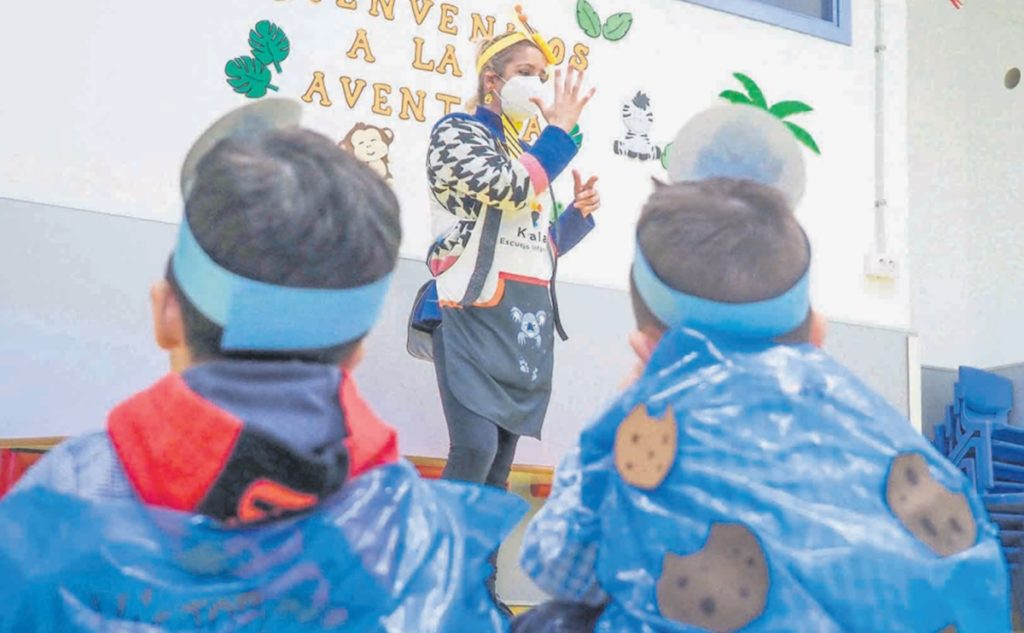
Little Fayna bangs on the table. She is not angry. She wants to get the attention of her caregiver Yazmina because it is her way of being able to communicate with her. Yazmina Cabrera has been working for two years as a child education assistant at the EI San Matías of the City Council of San Cristóbal de La Laguna. Every morning she teaches a Sign Language class to the children of this school managed by Koala Escuelas Infantiles for 3 years. During their classes, the students react with faces of astonishment, with curiosity and with an eagerness to imitate. They communicate with Yazmina through lip reading, touch or through electronic support or a blackboard, and they have transparent masks. “Boys and girls normalize the situation, intuitively and naturally. They try to communicate with me through vibration and touch”, explains this child assistant.
Yazmina suffers from hearing loss, which consists of decreased hearing sensitivity and affects one or both ears, but this is not an obstacle to carrying out her work at the San Matías nursery school. A profession that she chose because “I love seeing the evolution of boys and girls in their different types of learning and being part of that process. I am gratified by the affective bond that is established between the educators and the boys and girls”, she explains.
This Tenerife woman started a Pedagogy degree but was not convinced, and for this reason, she decided to study Teaching, and when “I began to carry out my work as an educator, I felt that it really was my vocation,” she recalls. Yazmina’s dream is the integration of sign language in education from an early age “that allows them to identify diversity as a personal enriching factor that generates feedback between equals”, she says.
Joining efforts to achieve greater integration of sign language in early childhood education, Koala Escuelas Infantiles collaborates with entities that work with the aim of improving the quality of life of deaf people. Currently, Koala is coordinating with the Association of Deaf People of Tenerife (Asorte) in the intervention with deaf minors. This association is committed to the social, educational and cultural improvement of deaf people, to spread, defend and promote the Spanish Sign Language, as well as to work for the elimination of existing communication barriers in society.
The pandemic has impaired the ability of deaf people to integrate, especially due to the use of a mask. “I have lost my autonomy when it comes to relationships, for example, now to go to the doctor I need to be accompanied by someone. With masks I cannot read lips and I need to do so to communicate”, laments Yazmina. Her story is common to that of more than a million people who suffer from some type of hearing disability in Spain, according to the National Institute of Statistics (INE).
“Children imitate us”
The head and teacher of early childhood education at EI San Matías, Sandra León Armas, is delighted with Yazmina’s daily work at the school and admits that “while she learns with us, we learn with her. Having a partner with a hearing disability helps us work on empathy and diversity at these ages that normalize everything,” she says. Sandra comments that Yazmina is very enthusiastic about integrating sign language into the center’s educational program and proposes numerous projects.
An example of this has occurred during the week of Carnival, where the educational team has included carnival words in sign language and the children have been receptive because they know that this way they will be able to communicate better with their caregiver Yazmina. “The children greet her with gestures. They imitate us and do it just like us. They know that Yazmina communicates through gestures and not words”, explains Sandra.
“We are very happy to have Yazmina in the team. This is very enriching for everyone. Sign language must be incorporated into education, because there is not only verbal communication, ”he reflects aloud while watching Yazmina move her hands before the absorbed gaze of the little ones.
















